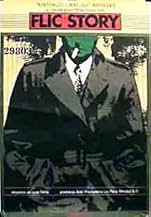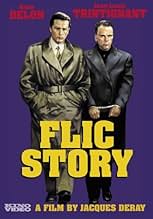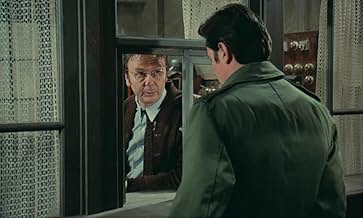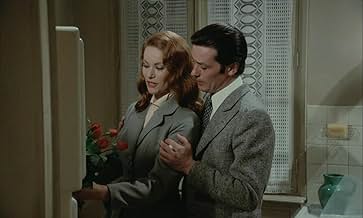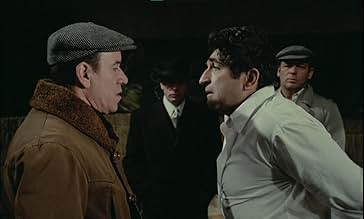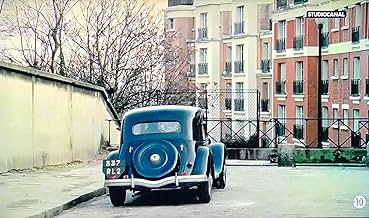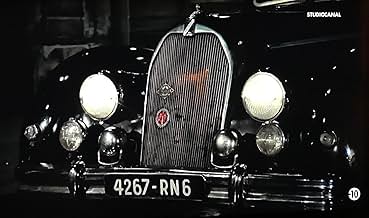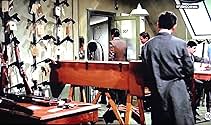IMDb-BEWERTUNG
6,9/10
3294
IHRE BEWERTUNG
Die Jagd nach einem erfahrenen Killer wird für einen Polizisten zu einer Frage des Lebens. Actiongeladenes Drama, das auf wahren Begebenheiten beruht.Die Jagd nach einem erfahrenen Killer wird für einen Polizisten zu einer Frage des Lebens. Actiongeladenes Drama, das auf wahren Begebenheiten beruht.Die Jagd nach einem erfahrenen Killer wird für einen Polizisten zu einer Frage des Lebens. Actiongeladenes Drama, das auf wahren Begebenheiten beruht.
- Regie
- Drehbuch
- Hauptbesetzung
Empfohlene Bewertungen
The best performances for both Trintignant and Delon, based on a true story dig in the criminal files of the French police. Classical, nothing unexpected but so brilliantly made, pulled by excellent acting and directing. Trintignant told later that he disliked the character he played here, so far from his own sensibility; and that's precisely for this reason that's his performance is awesome. The true definition of a true actor, who can play characters totally different from himself. Don't miss his glance, his terrific and terrifying glance, maybe more terrifying than the real Emile Buisson himself. One of most cold blooded killer that the movie- and not only French - industry has ever shown. Great ending too.
'Flic Story' (1975) is one of the last films in a remarkable series of films 'noir' inspired by the world of French gangsters, made between the 1950s and the 1970s. The master of the genre was Jean-Pierre Melville, whose last film, 'Un flic' from 1972, cast Alain Delon as a crime fighting policeman. Rumor goes that when Jacques Deray undertook the making of this film inspired by a real case and true characters, after having managed to secure the participation of the two actors, he intended to give Delon the role of the gangster and Jean-Louis Trintignant that of the vigilante policeman. It would have been closer to the profiles of the previous roles played by the two, but it would have been a shame. The reversal of roles allows Trintignant to create one of the best performances of his career, and Delon is not bad at all either. The result was a film that Melville would surely have approved of.
Roger Borniche, whose memoirs inspired the film's script, had been a hero during World War II, who had enrolled in the police force because of a personal history. Idealistic, individualistic, unconventional in his choice of working methods, he often comes into conflict with his superiors and his entourage of bureaucratic colleagues, some of whom bear the burden of collaboration during the war. Having reached the position of inspector and with ambitions for advancement, he receives as a mission the capture of Emile Buisson, an escaped and extremely dangerous gangster who flees justice, robs and leaves corpses behind. The mission will not be simple and the pursuit will last many years.
The script is built as an alternation of scenes in which the policeman and the escaped criminal appear, the two meeting only at the end. The duel between Borniche and Buisson in the film translates into an artistic duel between the two great actors, among the most popular and appreciated of their generation. If a winner must be declared, he is Trintignant. They say that the roles of bad guys are easier to interpret. It may be true, but Trintignant's gaze of a killer (sometimes out of pleasure) can still freeze the blood in the veins of viewers. The criminal has one softer side: he loves Edith Piaf's music, and this will play a role in his capture, in an anthological scene. The entire cast is very well chosen and directed, the characters are credible, the milieu of crime and the police methods and stations of the 40s-50s are very authentically reconstructed. The only criticism I would make of the script is that it does not reflect the passage of time. The pursuit lasted for many years and became an obsession for the French media but also for the police, however the events unfold on screen in the almost two hours of cinema without marking the cinematic time. The screenwriters may have relied on the fact that this case was still present in the public memory of France in the 70s, but that is no longer true today. However, this is only a minor detail in an engaging and atmospheric film, which is worth watching or rewatching.
Roger Borniche, whose memoirs inspired the film's script, had been a hero during World War II, who had enrolled in the police force because of a personal history. Idealistic, individualistic, unconventional in his choice of working methods, he often comes into conflict with his superiors and his entourage of bureaucratic colleagues, some of whom bear the burden of collaboration during the war. Having reached the position of inspector and with ambitions for advancement, he receives as a mission the capture of Emile Buisson, an escaped and extremely dangerous gangster who flees justice, robs and leaves corpses behind. The mission will not be simple and the pursuit will last many years.
The script is built as an alternation of scenes in which the policeman and the escaped criminal appear, the two meeting only at the end. The duel between Borniche and Buisson in the film translates into an artistic duel between the two great actors, among the most popular and appreciated of their generation. If a winner must be declared, he is Trintignant. They say that the roles of bad guys are easier to interpret. It may be true, but Trintignant's gaze of a killer (sometimes out of pleasure) can still freeze the blood in the veins of viewers. The criminal has one softer side: he loves Edith Piaf's music, and this will play a role in his capture, in an anthological scene. The entire cast is very well chosen and directed, the characters are credible, the milieu of crime and the police methods and stations of the 40s-50s are very authentically reconstructed. The only criticism I would make of the script is that it does not reflect the passage of time. The pursuit lasted for many years and became an obsession for the French media but also for the police, however the events unfold on screen in the almost two hours of cinema without marking the cinematic time. The screenwriters may have relied on the fact that this case was still present in the public memory of France in the 70s, but that is no longer true today. However, this is only a minor detail in an engaging and atmospheric film, which is worth watching or rewatching.
One the most scabrous real case on France about a great criminal called Emile Buisson played glowingly by Jean-Louis Trintignant a true mad-dog, coldest killer, the movie starts when he escaped from prison in 1947, the Lieutenant Roger Borniche (Alain Delon) a sort of good manners cop and hard smoking man who want be promoted, then came up the golden opportunity, he was nominee to catch Buisson, due his fine background and sustained by his greedy and bad temper Chief Vieuchene (Marco Perrin) and leading a fine task force, in other hand Buisson exposes so much killing in same day an informer, giving hints for an aware and skillful Roger Borniche, in next day he sets up a siege at Buisson hideout, arresting his brother Jean-Baptiste, his partner Renee Bollec and Suzanne Bollec, Buisson had a luck and nerve to escape jumping over the dangerous roof to get the streets, through many contacts on underground's crime he was hidden on a distant farmer, between robbers and killings the cautious Buisson was so near to be arrest for Borniche, always slipping away on last minute, after exhaustive three years he bribes a Buisson's partner to reach him, Alain is great as always, but somehow Trintignant overtaken him on an outstanding and remarkable performance, the French cinema is growing in my conception so fast due the realistic pictures!!!
Resume:
First watch: 2020 / How many: 1 / Source: DVD / Rating: 8.5
Resume:
First watch: 2020 / How many: 1 / Source: DVD / Rating: 8.5
For those who didn't know the criminal history of France : Emile Buisson, born in 1902, started his robbers' life during the 30's, with his older brother. He get married, but his wife and their child died while he was in jail. And after this tragedy, Buisson became a killer. From jailhouses to asylums, Buisson finally escaped in 1947. For three years, almost 20 people were murdered, coldly, brutally shot by Emile. All victims of robberies, or thieves suspected for betraying Buisson. He was the first one in France to be called "P.E.n°1". It's these three years which are counted in "Flic Story". The young inspector Borniche had a lot of work to do in order to arrest Buisson. And he succeeded in 1950. And that wasn't the end. For four years, every crime was studied, dissected. In 1954, Buisson was condemned to die. Twice. On the dawn of February 28th, 1956, in the Santé Prison, M.Obrecht, the executioner, released the guillotine's chopper on Buisson's neck.
But if Borniche hadn't wrote his book, nobody would even remember about Buisson. The book is really good. So is the movie. Trintignant is probably too cute to play Buisson, but he gives a real performance : a real dead cold assassin. You have to like Delon, of course, even if he is great as Borniche ! (I think he is unbearable !) A good police movie !
But if Borniche hadn't wrote his book, nobody would even remember about Buisson. The book is really good. So is the movie. Trintignant is probably too cute to play Buisson, but he gives a real performance : a real dead cold assassin. You have to like Delon, of course, even if he is great as Borniche ! (I think he is unbearable !) A good police movie !
Sitting through this for the first time I was under the delusion it had been directed by Melville, although it didn't seem to be quite his style. Unsurprisingly, it wasn't, but by someone called Deray, whom I'd never heard of. The history of the pursuit, over several years, of a dedicated cop after an unrestrained and ruthless thief and killer, it turns out to be a masterpiece, with depth. Gradually it grows clear that the two men are psychologically related: two sides of one coin. It dawns on the viewer, or it did on this one, that it's to be doubted if there's anything that can be called free will. Both men are creatures of circumstance, who have not really chosen their destinies. There is a curious rapport between them. Cops need robbers, like cowboys need Indians. Each can look on the other and think: there, but for arbitrary fortune, go I. Buisson's use of his gun seems as natural and spontaneous as any of Tarantino's reservoir dogs. Borniche suffers his own harassment and pressures. No man chooses his birth or the pattern of his life. Or does he ? A thought-inducing experience.
Wusstest du schon
- WissenswertesBased on a true story.
- VerbindungenFeatured in Jinek: Folge #2.9 (2014)
Top-Auswahl
Melde dich zum Bewerten an und greife auf die Watchlist für personalisierte Empfehlungen zu.
- How long is Flic Story?Powered by Alexa
Details
- Erscheinungsdatum
- Herkunftsländer
- Sprache
- Auch bekannt als
- Cop Story
- Drehorte
- 8 Rue Désirée, Paris 20, Paris, Frankreich(Buisson hides out at Suzanne's apartment)
- Produktionsfirmen
- Weitere beteiligte Unternehmen bei IMDbPro anzeigen
- Laufzeit
- 1 Std. 47 Min.(107 min)
- Sound-Mix
- Seitenverhältnis
- 1.66 : 1
Zu dieser Seite beitragen
Bearbeitung vorschlagen oder fehlenden Inhalt hinzufügen

![Bande-annonce [OV]](https://m.media-amazon.com/images/M/MV5BNTg2NDc4MzgtZTFmZi00NTM2LWI4MmYtNjAzZGFiYzE5MmIyXkEyXkFqcGdeQXRyYW5zY29kZS13b3JrZmxvdw@@._V1_QL75_UX500_CR0)
